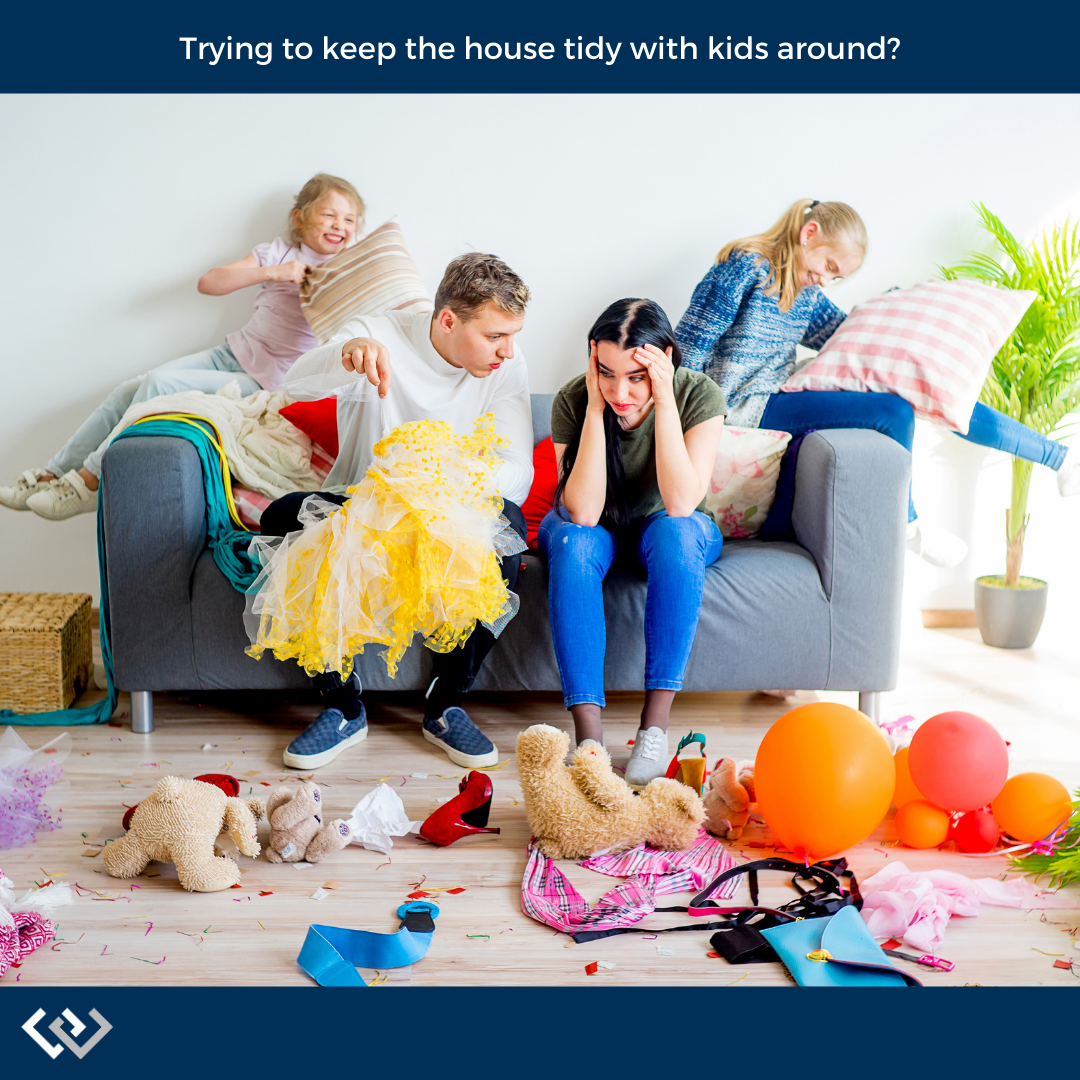A few years back, I was at a birthday party for a friend of my then 3-year old daughter. The house was immaculate, and I mentioned it to the friend’s dad. I’ll never forget his response. He said, “it’s always like this. My wife trained me how to keep a tidy house a few years ago and it’s changed my life for the better ever since! I’ll never go back to being the messy guy I was before.”
Unfortunately, I can’t say that I learned how to maintain a tidy house after that. But the concept that it’s possible, even with kids, has stuck with me. Because let’s be honest: managing clutter can be a mega challenge, and with kids added to the mix, it often feels pretty much impossible.
So, in an effort to step on less Lego pieces in the future, I found these 10 ideas online that might be worth trying for keeping your home tidy when you have kids:
1. Keep the Toys Circulating: Rotate & Donate
Instead of keeping every toy out and accessible, try rotating your child’s toys every month or so. This keeps them entertained by making “old” toys feel new again and reduces clutter. Simply pack away half the toys and rotate them every few weeks.
And, before rotating them back in, ask yourself if it’s time to donate? This keeps toys circulating inside and outside of your home. It’s a win-win.
2. Assign a ‘Home’ for Every Item
Create designated spots for everything, from backpacks to books to building blocks. When each item has a “home,” it’s easier for everyone to know where things go. This is key for getting kids to help clean up – it’s so much easier for them when they know what to do.
3. Use Clear Bins and Labels
Transparent bins are a game-changer for family organization. You can see what’s inside without opening every container, saving time and preventing spills. Label each bin (pictures work well for younger kids) to help everyone put things back where they belong.
4. Invest in Multi-functional Furniture
In small spaces, furniture that doubles as storage is essential. Ottomans that open up to store toys, beds with drawers underneath, and benches with cubbies are all perfect for keeping kids’ items organized and out of sight.
5. Establish a Daily Reset Routine
A 10-minute reset before bed can make a huge difference. Set a timer, turn on some music, and encourage everyone to pitch in. It’s amazing how much can get tidied up in a short time, and it helps start the next day with a clean slate.
6. Get Kids Involved in Decluttering
Kids are more likely to respect and maintain the organization if they’re part of the process. Make it a game, or let them be in charge of sorting toys into different bins. Teaching them about tidiness early on sets them up for future success.
7. Use Vertical Storage to Maximize Space
When floor space is limited, think vertical. Install shelves, hooks, and pegboards on the walls for everything from toys to art supplies. It keeps things accessible but out of the way, making your small space feel bigger and less cluttered.
8. Create a ‘Lost and Found’ Bin
Designate a basket as your family’s “lost and found.” If you find something misplaced, drop it in the bin. At the end of the week, everyone can retrieve their belongings from it. This cuts down on the scramble to find misplaced items daily.
9. Practice “One In, One Out” for New Items
For every new toy or item that comes into the house, try to donate or give away one thing that’s no longer used. This keeps things from piling up and encourages kids to value what they have, rather than accumulating items they’ll quickly forget.
10. Create Personal Spaces for Each Child
Even in small spaces, giving each kid a specific area for their belongings helps with organization. It might be a drawer, shelf, or cubby. When they have a spot for their treasures, they’re more likely to keep them tidy and less likely to add to the family clutter.
Will you give any of these a try? Putting some of these ideas into practice, especially before the holidays, could really help reduce stress and overwhelm. Here’s to less Lego injuries in 2025!
 Facebook
Facebook
 X
X
 Pinterest
Pinterest
 Copy Link
Copy Link
